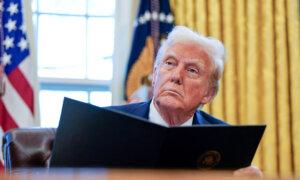The Trump administration had argued that the issue was moot.
WASHINGTON—District of Columbia District Judge Loren AliKhan issued a temporary restraining order following a Feb. 3 hearing over the spending freeze directed by the Trump administration.
“Rather than taking a measured approach to identify purportedly wasteful spending, Defendants cut the fuel supply to a vast, complicated, nationwide machine—seemingly without any consideration for the consequences of that decision,” she said.
Part of her order alleged that the administration’s “actions appear to suffer infirmities of a constitutional magnitude. The appropriation of the government’s resources is reserved for Congress, not the Executive Branch.” Her order also denied the Trump administration’s motion to dismiss the case.
The Trump administration argued that the issue was moot because the original lawsuit, which came from the National Council of Nonprofits and other groups, targeted a memo from the Office of Management and Budget (OMB) that had since been rescinded.
During remarks from the bench, AliKhan said she was inclined to issue a restraining order and not to find the case moot. She also expressed concern that the administration had continued to implement a freeze based on the memo. AliKhan referenced individuals being unable to access funding platforms with federal agencies.
“The declarations and evidence presented by Plaintiffs paint a stark picture of nationwide panic in the wake of the funding freeze,” AliKhan said in her order. “Organizations with every conceivable mission—healthcare, scientific research, emergency shelters, and more—were shut out of funding portals or denied critical resources beginning on January 28.”
Chief Judge John J. McConnell Jr. of the U.S. District Court of the District of Rhode Island pointed to a social media post from White House press secretary Karoline Leavitt, who said a federal funding freeze was still in effect. McConnell said the rescission was “in name only and may have been issued simply to defeat the jurisdiction of the courts.”
“The substantive effect of the directive carries on,” he said.
AliKhan similarly cited Leavitt’s social media post and said “it appears that OMB sought to overcome a judicially imposed obstacle without actually ceasing the challenged conduct.”
“The court can think of few things more disingenuous,” she added.
Department of Justice attorney Daniel Schwei told AliKhan that the executive orders referenced by the OMB memo allowed for spending pauses and that the plaintiffs had not proven that the remaining freezes were attributable to the OMB memo.
McConnell’s order, he said, was also phrased in a way that obviated the need for her to issue another order of her own. He said relief, if provided at all, should be provided by directly targeting individuals who had demonstrated they were harmed by the freeze rather than by blocking the administration’s actions more broadly.
Part of Schwei’s argument was that the plaintiffs were asking for extraordinary relief that would see the court superintend all federal assistance and intrude on the executive’s authority.
AliKhan seemed skeptical of his arguments and said at the hearing’s conclusion that she thought factors such as the public interest weighed in favor of issuing a temporary restraining order.
Schwei argued that agencies handled funding at their own discretion, but Kevin Friedl, an attorney representing the plaintiffs, said he disagreed that the government’s actions could be attributed to agencies acting independently.
He pointed to claims that organizations were prohibited from accessing funding portals and said the Trump administration had implemented a mechanism for instituting blanket freezes rather than targeting individual grants. AliKhan responded in part by telling him that he made a good point.
Schwei indicated that the government would appeal a block issued by AliKhan, telling her that the administration would like a stay pending appeal or at least an administrative stay to allow the government to seek emergency relief.
Original News Source Link – Epoch Times
Running For Office? Conservative Campaign Consulting – Election Day Strategies!


